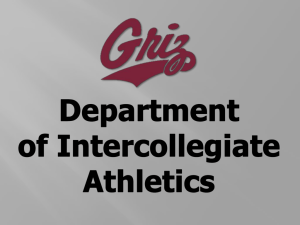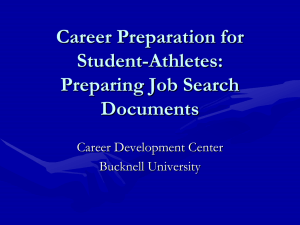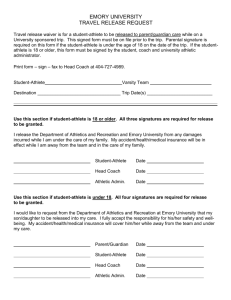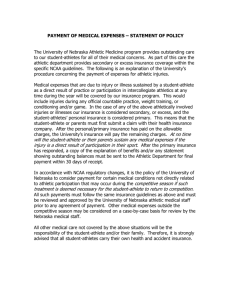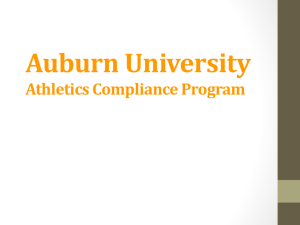Hampden-Sydney College Student
advertisement
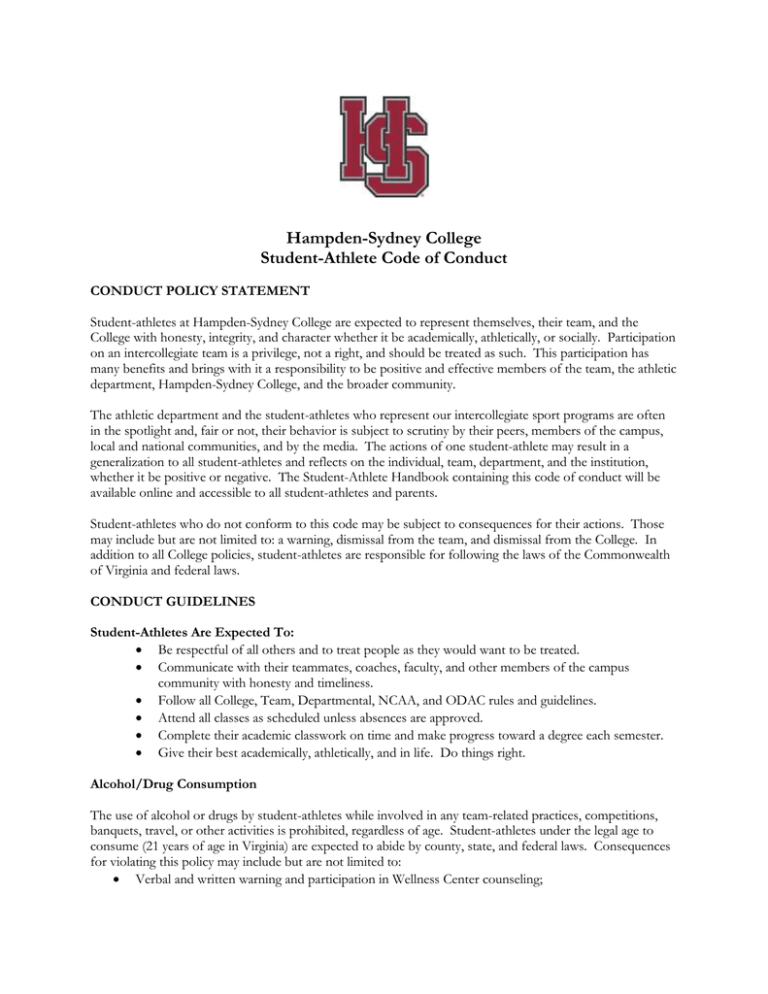
Hampden-Sydney College Student-Athlete Code of Conduct CONDUCT POLICY STATEMENT Student-athletes at Hampden-Sydney College are expected to represent themselves, their team, and the College with honesty, integrity, and character whether it be academically, athletically, or socially. Participation on an intercollegiate team is a privilege, not a right, and should be treated as such. This participation has many benefits and brings with it a responsibility to be positive and effective members of the team, the athletic department, Hampden-Sydney College, and the broader community. The athletic department and the student-athletes who represent our intercollegiate sport programs are often in the spotlight and, fair or not, their behavior is subject to scrutiny by their peers, members of the campus, local and national communities, and by the media. The actions of one student-athlete may result in a generalization to all student-athletes and reflects on the individual, team, department, and the institution, whether it be positive or negative. The Student-Athlete Handbook containing this code of conduct will be available online and accessible to all student-athletes and parents. Student-athletes who do not conform to this code may be subject to consequences for their actions. Those may include but are not limited to: a warning, dismissal from the team, and dismissal from the College. In addition to all College policies, student-athletes are responsible for following the laws of the Commonwealth of Virginia and federal laws. CONDUCT GUIDELINES Student-Athletes Are Expected To: Be respectful of all others and to treat people as they would want to be treated. Communicate with their teammates, coaches, faculty, and other members of the campus community with honesty and timeliness. Follow all College, Team, Departmental, NCAA, and ODAC rules and guidelines. Attend all classes as scheduled unless absences are approved. Complete their academic classwork on time and make progress toward a degree each semester. Give their best academically, athletically, and in life. Do things right. Alcohol/Drug Consumption The use of alcohol or drugs by student-athletes while involved in any team-related practices, competitions, banquets, travel, or other activities is prohibited, regardless of age. Student-athletes under the legal age to consume (21 years of age in Virginia) are expected to abide by county, state, and federal laws. Consequences for violating this policy may include but are not limited to: Verbal and written warning and participation in Wellness Center counseling; Suspension from the team; Loss of eligibility and dismissal from the team; Dismissal from the College. Additionally, it is expected that the consumption of alcohol by student-athletes who are of legal age will be within the parameters of team and College policies and will be handled responsibly. Consequences for underage alcohol use, inappropriate alcohol use by student-athletes of legal age to consume, or illegal drug use will be determined on a case by case basis. The Head Coach and the Director of Athletics may be involved with determining sanctions for violating this policy with the Director of Athletics having final authority. All Hampden-Sydney student-athletes are subject to random drug testing. Local, State, and Federal Laws Student-Athletes who are alleged (including arrested or charged) to have broken local, state, or federal laws will be subject to team and departmental sanctions upon a case by case review. Violations involving physical and/or sexual violence, use of illegal weapons, or driving under the influence will be subject to immediate suspension from the team pending further investigation. The Head Coach, in consultation with the Director of Athletics, will impose sanctions. Team or Athletic Department disciplinary sanctions may be imposed in advance of any campus disciplinary and/or criminal actions. Disciplinary sanctions may include but are not limited to: admonishment, written reprimand, suspension from the team, and dismissal from the team. Additional sanctions may be imposed by the College including probation, suspension from school, or expulsion. For the purposes of this code of conduct, suspension from the team means that student-athletes may not practice, compete, or travel with any Hampden-Sydney College team. Suspended student-athletes may, with permission of the Head Coach and Director of Athletics, attend team meetings and retain privileges to access the training table, the athletics training room, academic support services, and individual use of the weight room. Exceptions to any of these terms may be made by the Director of Athletics. Harassment and Discrimination Policy (Including Sexual Harassment) Every College staff member, faculty member, and student has the right to work and study in an environment free from discrimination and harassment and should be treated with dignity and respect. The College prohibits discrimination and harassment against applicants for employment or admission, students, faculty, or staff on the basis of race, religion, national or ethnic origin, age, sex, disability, sexual orientation, status as a veteran, or any other classification protected by local, state or federal law, as applicable. The College's policy against discrimination and harassment ("Policy") incorporates protections afforded by Title IX of the Educational Amendments of 1972, which prohibits discrimination in educational programs and activities based on gender. The Policy also incorporates all other local, state, and federal laws, including Title VII of the Civil Rights Act of 1964. Any individual whose conduct violates the Policy will be subject to disciplinary action up to and including termination for the faculty and staff and expulsion for students. The full text of the Harassment and Discrimination Policy can be found online or obtained in print from the Human Resources Office. If you have questions about the Policy, or if you believe you have been discriminated against or harassed in violation of this Policy, you are encouraged to contact the appropriate person for your situation. Students should contact the Dean of Students If the complaint is against afore mentioned official, contact the Director of Human Resources. Examples of prohibited conduct: Unwelcome sexual flirtation, advances, or propositions; Continued or repeated verbal abuse of a sexual nature; Sexually degrading language to describe an individual; Unwelcome remarks of a sexual nature to describe a person’s body or clothing; Display of sexually demeaning objects or pictures; Offensive physical contact, such as unwelcomed touching; Coerced sexual intercourse; Sexual assault. (434) 223-6000 Hazing Policy Hazing by any member of the campus community is prohibited by Hampden-Sydney College. Hazing is prohibited whenever it occurs on or off College premises or in connection with any College related group or activity. Student-athletes who violate the protection against hazing are subject to discipline. Any criminal complaints will be reported to law enforcement. Hazing is an act that endangers the mental or physical health or safety of an individual (including, without limitation, an act intended to cause personal degradation or humiliation), or that destroys or removes public or private property, for the purposes of initiation in, admission to, affiliation with, or as a condition for continued membership in a group or organization. Such activities include but are not limited to: Physical punishment, contact, exercise, or sleep deprivation that causes excessive fatigue and or physical or psychological shock; Forced or coerced consumption of food, drink, alcohol, tobacco, and/or illegal drugs; Forced or coerced transportation of individuals; Public humiliation, ridicule, indecent exposure or ordeal; Coercing or forcing illegal acts; Coercing or forcing acts that are immoral or unethical; Blocking an individual’s academic, athletic, health, or personal success; Personal servitude; Mental harassment; Sexual harassment; Deception; Threat of social exclusion; Any activity that involves the use of alcohol or any controlled substance; Any activity that is not in accordance with Hampden-Sydney College established policies. Gambling Policy Student-athletes are expected to abide by the NCAA rule (Bylaw 10.3) which prohibits student-athletes from knowingly: Providing information to individuals involved in organized gambling activities concerning intercollegiate athletics competition; Soliciting a bet on any intercollegiate team; Accepting a bet on any team representing Hampden-Sydney College; Soliciting or accepting a bet on any intercollegiate competition for any item that has tangible value; Participating in any gambling activity that involves intercollegiate athletics, or professional athletics, through a bookmaker, a parlay card, or any other method employed by organized gambling. Monetary winnings from fantasy leagues are prohibited. Social Media Policy Think Twice. Don’t Be Stupid. It is a privilege to play intercollegiate sports and compete for Hampden-Sydney College. H-SC studentathletes are representatives of the College and the community; they are to exercise prudent judgment and act as gentlemen at all times and in all places. A student-athletes use of social media is also held to these high expectations and they are expected to conduct themselves in a respectful and responsible way when engaging on social media. It is forbidden for student-athletes to post any information, photos, or other representation of sexual content, inappropriate behavior, drug use, alcohol use, or items that could be interpreted as offensive or demeaning. Student-athletes are required to abide by all rules and policies set by teams, the Hampden-Sydney Athletic department, and the NCAA when engaging on social media. Student-athletes should in no circumstance (unless dictated otherwise) initiate communication with a prospective student-athlete as a result of the prospective student-athlete’s recruitment by H-SC. Student-Athletes should not engage in conversation or interact with members of opposing teams before competition. Reminders Always think twice before posting. If you wouldn’t want your coach, parents, or future employer to see your post, don’t post it. Be honest, be smart, be positive, and be respectful. Your post is permanent well after you choose to “delete” it. The internet is permanent and even though you think you’ve deleted a post, it still exists somewhere. Protect yourself, protect your accounts! Always use maximum privacy settings! Whenever you are wearing H-SC gear you are an official representative of Hampden-Sydney College. Any violation of the Student Athlete Social Media Policy may result in disciplinary action which could include temporary or permanent suspension from the team. Drug Testing Policy Philosophy The Athletic Department at Hampden-Sydney College (hereafter referred to as “Department” believes that the abuse of legal drugs and/or the use of illegal drugs, alcohol, and performance enhancing drugs can adversely affect the health and safety as well as the academic capability of student-athletes. In an effort to minimize the possibility that a student-athlete may jeopardize his own physical and academic performance, the Department has developed and approved the following drug testing policy and procedure. Policy Overview The Department reserves the right to require a drug test from any participant in a sports program recognized, operated, or controlled by or under the authority of the Department. Participants include all male eligible student-athletes, including those healthy, injured, red-shirted, or transferred. Every student-athlete will be provided notice of the Department’s drug education and testing program prior to his participation in a sport event, including practice times preceding event season. Drug testing will be done randomly each month from September through April. An athlete will be notified of his selection on the day drug testing will take place. A urine drug test will be done. Screening will be done for substances identified on the NCAA banned drug list. A consent form authorizing the taking of specimen and testing of that shall be signed annually by each athlete and/or his parent or guardian. Analyses of specimen provided for testing will be performed by an independent laboratory selected by Hampden-Sydney College. Test results shall be shared with those identified in the consent form. Strict confidentiality of test results, except as authorized by the consent, shall be maintained in accordance with the procedures that follow. At the discretion of the athletic director, each athletic team may be tested in its entirety at any time during the school year. In addition, if there is reasonable suspicion that an athlete is using banned drugs and substantial proof can be documented, the suspected athlete may be selected for drug testing at the athletic director’s discretion. At the beginning of each academic year or at other times as determined by the Department, a presentation will be made to all student-athletes to review and explain the Department’s drug testing policy and procedure. This presentation will take place prior to an athlete being selected for drug testing. Consent to participate in this program shall be required as a prerequisite for participating in any intercollegiate athletics activity. The consent forms will be signed and available in each athlete’s file. Nutritional supplements are not strictly regulated and may contain substances banned by the NCAA. You will be subjected to the ramifications of this Drug Policy if you test positive for a substance listed in this policy even if you consumed the substance in the form of a nutritional supplement. For guidance, visit www.drugfreesport.com/rec for information on supplements and banned substances. The Department does not provide any supplements or banned substances to any of its athletes. Student-athletes who are taking drugs pursuant to prescription from a physician must register in writing with the Department. A copy of the prescription on file in the student-athlete’s medical records as maintained by the Department will suffice. It is possible that some prescription drugs may result in a positive test for proscribed substances (e.g., Ritalin for ADD). If a student-athlete tests positive because of a medication for a medically diagnosed reason, the student-athlete will proceed with a medical exception. Purposes The purposes of the Department’s drug testing policy are: To inform and educate the student-athlete about the harmful effects of substance abuse and misuse. To deter the potential abuse of, misuse of, or experimentation with drugs and other harmful substances. To provide any student-athlete determined to be affected by substance use or abuse, with the opportunity to obtain rehabilitation through professional evaluation, counseling, or referral for treatment; and To protect and preserve the integrity of the individual athletes, the Department, and HampdenSydney College. Notification and Reporting An athlete will be notified of their selection no more than forty-eight hours prior to the scheduled test and may be subject to no-notice testing. The athlete will be notified by the athletic training staff by live conversation on phone or in person. If a student-athlete reports to the testing site and subsequently leaves the site without permission from the drug testing administrator, he shall be considered an offender. Collection Procedures In order to implement this drug policy, it shall be necessary to acquire a urine specimen from the studentathlete. Urine voiding shall be monitored by a member of the contracted drug testing agency of the same gender as the student-athlete. The student-athlete may be required to remove obstructive clothing prior to voiding to ensure proper urine identification and adherence to testing protocol. A student-athlete failing to report for drug testing after notification, or failing to follow testing protocol, or attempting to alter the integrity (i.e. masking agent, foreign substances, etc.) or validity of sample, or refusing to provide a sample shall constitute a positive drug test. The procedures and methodologies for obtaining test specimen will be described and distributed to studentathletes. Penalties Positive drug tests will be cumulative over a student-athlete’s entire eligibility with the institution. Student-athletes demonstrating positive drug test results will be subject to the following actions: If any student-athlete tests “positive”, that is, if the tests show that drug residue substances are present in the student’s system, the Head Athletic Trainer will inform the student-athlete within 2448 hours after the positive confirmation has been received from the laboratory and may meet privately with the student-athlete to explain the type of substance identified. The test results will be communicated to the Athletic Director, Dean of Students, Student Justice System, Head Athletic Trainer, the staff athletic trainer overseeing that sport, and the Head Coach of the appropriate sport. The parent or guardian identified and authorized by the student-athlete will also be contacted and informed of the positive test result. In a first positive, if any for substances identified on the NCAA banned drug list are discovered in a student-athlete, the athlete will be referred to student counseling services. Upon confirmation of a positive test, a student-athlete will be declared ineligible for the next twenty percent of the regularly scheduled intercollegiate competitive events following the positive test. If the first positive test occurs in the off season, the student-athlete will be declared ineligible for the first twenty percent of the regularly scheduled intercollegiate competitive events of the next season. Also, the studentathlete will accountable to the Student Justice System. Upon the event of a second positive test result for substances identified on the NCAA banned drug list, the student-athlete will be declared ineligible for the next 365 days from the date of testing. The athlete will be referred to student counseling services. In the event of a second positive drug test, a meeting will be conducted with the Head Coach, Athletic Director, Head Athletic Trainer, and the parent or guardian as identified and authorized by the student-athlete to discuss, either in person or by telephone, the actions to be taken by the Department. Also, the student-athlete will accountable to the Student Justice System. A third positive drug test will result in immediate dismissal from the team indefinitely. Also, the student-athlete will accountable to the Student Justice System. Refusing to provide a drug testing specimen or failing to appear at the time scheduled for the drug test, will be considered a positive drug test. Any positive drug test under the NCAA testing program will also count as a positive test under the Department’s policy. Appeals If the student athlete challenges the test results as a positive, he must notify the Athletic Director and Head Athletic Trainer within 48 hours after meeting or talking by phone with the Head Athletic Trainer to discuss the test results. The appeal must be submitted in writing. Appeals of a positive test are NOT automatic. Upon receiving the notice of appeal, the Head Athletic Trainer and/or Athletic Director will meet with the student-athlete for further discussion about the reliability of the test and to determine whether an additional test should be administered. If an additional test is administered, the student-athlete has the right to have the “B Bottle” tested, at the same laboratory. The laboratory findings of the “B Bottle” analysis shall be final. During the appeal process, the eligibility of the student-athlete will be determined at the discretion of the Head Athletic Trainer (for reasons of health and safety) and the Athletic Director. The Athletic Director reserves the right to modify the sanctions set forth in the Penalties section at his/her discretion. The NCAA bans the following classes of drugs: Stimulants Anabolic Agents Diuretics and Other Masking Agents Street Drugs Peptide Hormones and Analogues Anti-estrogens Beta-2 Agonists Note: Any substance chemically related to these classes is also banned. The institution and the student-athlete shall be held accountable for all drugs within the banned drug class regardless of whether they have been specifically identified. Drugs and Procedures Subject to Restrictions: Blood Doping Local Anesthetics (under some conditions). Manipulation of Urine Samples Beta-2 Agonists permitted only by prescription and inhalation Caffeine if concentrations in urine exceed 15 micrograms/ml. Some Examples of NCAA Banned Substances in Each Drug Class: NOTE: There is no complete list of banned drug examples!! Check with your athletic department staff before you consume any medication or supplement. Stimulants: amphetamine (Adderall); caffeine (guarana); cocaine; ephedrine; enfluramine(Fen); methamphetamine; methylphenidate (Ritalin); phentermine (Phen); synephrine (bitter orange); etc. Anabolic Agents – (sometimes listed as a chemical formula, such as 3,6,17-androstenetrione) boldenone; clenbuterol; DHEA; nandrolone; stanozolol; testosterone; methasterone; androstenedione; norandrostenedione; methandienone; etiocholanolone; trenbolone; etc. Diuretics (water pills) and Other Masking Agents: bumetanide; chlorothiazide; furosemide; hydrochlorothiazide; probenecid; spironolactone (canrenone); triameterene; trichlormethiazide; etc. Street Drugs: heroin; marijuana; tetrahydrocannabinol (THC) Peptide Hormones and Analogues: growth hormone(hGH); human chorionic gonadotropin (hCG); erythropoietin (EPO); etc. Anti-Estrogens: anastrozole; tamoxifen; formestane; 3,17-dioxo-etiochol-1,4,6-triene(ATD), etc. Beta-2 Agonists: bambuterol; formoterol; salbutamol; salmeterol; etc. Any substance that is chemically related to the class of banned drugs is also banned! Tobacco Policy Hampden-Sydney Athletics does not condone the use of tobacco. The use of tobacco is prohibited in connection with any intercollegiate team function. A team function is defined as any activity which is held as a team whether it is meetings, practices, games, or informal workouts on and/or off the grounds of Hampden-Sydney College. NCAA legislation prohibits use of tobacco products. “If one school allows (its student-athletes or coaches to use) tobacco and another school reports that infraction to the enforcement department, and it can be proven that tobacco was used, the (potential) penalty will likely be more severe, just as with other violated and not self-reported acts”. Sickle-Cell Testing Policy Overview Sickle-cell trait is a congenital condition that affects the shape of red blood cells. Red blood cells are responsible for carrying oxygen throughout the body for normal metabolic function. Red blood cells that are deformed or sickled carry less oxygen to tissues and organs. An additional concern with sickle cell anemia is the chance for these red blood cells to obstruct normal blood flow through the circulatory system further leading to hypoxia (reduced oxygen) to all tissues including muscle and organs. Therefore, this condition can have a negative effect on athletes during rigorous exercise. Policy In order to provide better medical coverage for our H-SC student-athletes that may have this condition, there are options for the student-athlete and parents to consider: Receive a sickle cell screening test and give written results of the test to the Athletic Training department for our medical records. This can be requested at the time of your annual returning physical depending on services available at each clinic. Retrieve written results of sickle cell testing performed at birth. In most states it is mandatory that all newborns are screened. These records can be obtained from the hospital where the student-athlete was born. You may go to the National Newborn Screening & Global Resource Center (NNSGRC) for information on this at: http://genes-rus.uthscsa.edu/resources/consumer/statemap.htm Receive a blood solubility test at Hampden-Sydney College during a scheduled screening through services contracted outside of the College. These dates are arranged by the Athletic Training department in coordination with the Wellness Center at times convenient for student-athletes before the beginning of preseason training. In the event of a positive blood solubility test for sickle-cell trait, H-SC student-athletes may be required to have a confirmation test to verify the results. Regardless, a positive test for sickle-cell trait WILL NOT disqualify any H-SC student-athlete from participating in their respective sport. Instead safeguards will be instituted by the athletic training department and coaching staff to ensure an optimal safe playing environment. These include but are not limited to: Modifications for conditioning (especially preseason). Counseling on the impact of sickle-cell trait during athletic participation. Counseling on the impact of sickle-cell trait during activities of daily living. Medical clearance to participate will not be granted until written results of sickle cell testing are received by the Athletic Training department. Sickle cell testing will be required only once for entering freshmen/transferring student-athletes. Educational materials will be provided to student-athletes, coaches, and parents. A signed waiver is available for H-SC student-athletes under approved circumstances who do not wish to undergo sickle-cell screening. Education for sickle-cell trait will be required in the event of the waiver option. Concussion Protocol The Hampden-Sydney College Athletic Training Department recognizes that sport induced concussions pose a significant health risk for those student-athletes participating in athletics at Hampden-Sydney College. With this in mind, the Athletic Training Department has implemented policies and procedures to assess and identify those student-athletes who have suffered a concussion. The Department also recognizes that baseline neurocognitive testing on student-athletes who participate in those sports which have been identified as collision and or contact sports and/or who have had a history of concussions prior to entering Hampden-Sydney College will provide significant data for return to competition decisions. This baseline data along with physical examination, and/or further diagnostic testing will be used in conjunction in determining when it is safe for a student athlete to return to competition. What is a Concussion? Due to the complexity of the injury and ever-growing research, a unanimous definition of “concussion” does not exist. A concussion can be caused by a direct or indirect hit to the head or body and can result in a disturbance and/or impairment in neurologic function. When an athlete suffers a concussion, the brain suddenly shifts or shakes inside the skull and can knock against the skull’s bony surface. A hard hit to the body can result in an acceleration and/or deceleration injury when the brain brushes against bony protuberances inside the skull. The exact recovery period from this trauma is unclear and will vary from individual to individual. Following a concussion, the athlete may experience a variety of symptoms. Most concussions occur without a loss of consciousness. It is important to remember that some symptoms may appear right away and some may be delayed. Symptoms, as well as symptom severity, may differ between individuals; however, a combination of symptoms classically occurs. Some Signs and Symptoms Include: Signs: Symptoms: - Difficulty concentrating - Nausea/vomiting - Inappropriate playing behavior - Dizziness - Decreased playing ability - Confusion - Inability to perform daily activities - Fatigue - Reduced attention - Light headedness - Cognitive and memory dysfunction - Headaches - Sleep disturbances - Irritability - Vacant stare - Disorientation - Loss of bowel and/or bladder control - Seeing bright lights/stars - Personality change - Feeling of being stunned - Unsteadiness of gait - Depression - Slurred/incoherent speech - Ringing in the ears - Loss of consciousness Concussion Education In accordance with NCAA recommendations, the student-athletes will be annually presented with educational materials that provide information about the mechanisms of head injury, as well as the signs and symptoms of a concussion. Subsequently, it will be required that all student-athletes sign Hampden-Sydney College Student-Athlete Concussion Statement (Appendix A), a statement accepting the responsibility for truthfully reporting of his injuries and illnesses, including signs and symptoms of a concussion. Additionally, each coach at Hampden-Sydney College will undergo concussion education and will be required to sign Hampden-Sydney College Coaches Concussion Statement (Appendix B). Due to the severe nature of a concussion, Hampden-Sydney College believes in a conservative approach for treatment. This includes the student-athlete self-reporting his or her symptoms after suffering a concussion. Self-reporting of symptoms plays an integral role in tracking the severity and subsequent recovery of a concussion. Therefore, the student-athlete is responsible for reporting his signs and symptoms completely and honestly to the medical staff as soon as they present and each day following the injury. Notification of Injury/Symptoms Due to the serious nature of this injury and potential dangerous results of returning to activity, concussions need to be recognized and diagnosed as soon as possible. It is required that student-athletes be truthful and forthcoming about their symptoms as soon as they are present. If/when they are diagnosed with a concussion, the student-athlete must report symptoms each day until they are cleared for full activity by the team physician. Baseline Testing Hampden-Sydney College utilizes a program called SportsWare Plus which maintains records for all information regarding each student-athlete. A baseline assessment consisting of both subjective and objective tests, standardized cognitive and balance assessments, and physical evaluation will be performed on student-athletes deemed “high risk athletes,” defined by the NCAA as baseball, basketball, football, lacrosse, and soccer, before the start of their competitive season. Student-athletes will be baseline tested using Standardized Assessment of Concussion (SAC) (Appendix C) with Post Concussion Symptom Scale (Appendix D). Recognition, Evaluation and Confirmation When a student-athlete shows any signs, symptoms or behaviors consistent with a concussion, the athlete shall be immediately removed from athletic participation until a thorough sideline head injury assessment can be performed. Head injuries sustained during competition will be evaluated first by the team physician on site. If no team physician is on site, the Certified Athletic Trainer on duty will perform the evaluation. The sideline head injury assessment to determine the presence of a concussion will include: SAC Post Concussion Symptom Scale The team physician and staff Certified Athletic Trainer should suspect a concussion if any non-baseline symptoms are detected after a blow to the head. In addition, SAC scores inconsistent with baseline scores should be interpreted as a possible concussion resulting in the removal of the athlete from athletic participation. If a staff Certified Athletic Trainer determines that a student-athlete has or may have a concussion, the staff Certified Athletic Trainer must report that fact to the team physician. The student-athlete must be evaluated by the team physician and/or appropriate, qualified medical personnel acceptable to the team physician as soon after the concussion as is practical. Each injury sustained will be evaluated on a case by case basis. The manner in which the injury occurs, the individual history, special testing, and other factors all play a key role in identifying concussion. The baseline testing will be used in conjunction with other tests deemed necessary by medical staff to determine the level of injury. Same Day Return-to-Play A student-athlete diagnosed with a concussion shall be withheld from the competition or practice and will not return to any athletic activity for the remainder of that day and until cleared by the team physician and/or appropriate qualified medical personnel acceptable to the team physician. Referrals Upon removal from athletic participation, the student-athlete will receive serial monitoring (approximately every 5 minutes) for signs of deterioration and can cease when the student-athlete stabilizes and improves or the student-athlete’s condition warrants a referral according to the guidelines set forth herein. On-the-Field Immediate Referral Upon initial evaluation, activation of the appropriate Emergency Action Plan and subsequent immediate referral to an appropriate emergency treatment facility is warranted with any of the following findings: Loss of consciousness Deteriorating level of consciousness High index of suspicion of spine or skull injury Seizure activity Evidence of hemodynamic instability/deterioration of vital signs Off-the-Field Immediate Referral Upon serial monitoring, activation of the appropriate Emergency Action Plan and subsequent immediate referral to appropriate emergency treatment facility is warranted with any of the following findings: Deterioration of neurological signs such as motor, sensory and cranial nerve deficits subsequent to initial on-field assessment Documented loss of consciousness Deteriorating level of consciousness Post-concussion symptoms that worsen Non-Immediate Referral All student-athletes who have been diagnosed with a concussion shall be cleared in writing by the Hampden-Sydney College team physician and/or qualified medical personnel prior to return to unrestricted activity. Follow-Up Care In the event of a concussion, follow-up care and proper education is critical. Due to the necessity of serial monitoring for deterioration of symptoms, the student-athlete will be released under the care of an on-campus emergency contact when discharged from the care of the team physician and/or Certified Athletic Trainer. The Concussion Take-Home Instructions (Appendix E) will be explained and given to both the concussed student-athlete as well as the on-campus emergency contact. Pertinent contact information will be provided in addition to scheduled follow up appointments. The concussed student-athlete will be contacted 3-4 hours after discharge to ensure appropriate arousal and cognitive function. In the circumstance that neither the concussed student-athlete nor the on-campus emergency contact can be contacted, the situation will be deemed emergent and the Hampden-Sydney College Campus Security will be alerted. Subsequent Testing Concussed student-athletes will be assessed daily with the assistance of the SAC and Signs and Symptoms checklist. Return to Play Guidelines “Return-to-play” is the process of deciding when an injured or ill student-athlete may safely return to practice or competition. It is the goal of Hampden-Sydney College to return an injured or ill student-athlete to practice or competition without putting the individual or others at undue risk for injury or illness. When an asymptomatic status has been established and neurocognitive scoring has returned to the baseline level, a progression will be utilized for return to play. The progression is a step-by-step procedure where an asymptomatic level is maintained as functional exercise is slowly added to the activity level. Progressions are individualized on a case by case basis. The studentathlete may not progress to the next step until they are completely symptom free in the current step. The student-athlete may not progress faster than one step per day. The Hampden-Sydney College Athletic Training Staff will be in direct contact with the team physician while progressing the student-athlete through the program. Only the team physician can give the athlete clearance to return to athletic participation. It is important to note that this timeline could last over a period of days, weeks, months or ultimately result in potential medical disqualification from the participation in Hampden-Sydney College Athletics. The return to play progression is a 6 step process. No activity- Directly after being diagnosed with a concussion, the athlete should have total physical and mental rest. Light aerobic exercise- Walking, swimming, or biking while keeping heart rate below 70% of max. Sport-specific exercise- Basic low impact drills associated with the athletes sport. (No head impact activities) Non-contact training drills- Progress to more complex drills. Full contact Practice- After receiving medical clearance, athlete may resume normal training activities. Return to Play Reference Documents 1. Concussion (Mild Traumatic Brain Injury) and The Team Physician: a Consensus Statement. Medicine & Science in Sports & Exercise (2006). 395-399. 2. Guskiewicz, K. M., Bruce, S. L., Cantu, R. C., Ferrara, M. S., Kelly, J. P., McCrea, M., et. al. (2004). National Athletic Trainers’ Association Position Statement: Management of Sport-Related Concussion. Journal of Athletic Training, 39(3), 280-297. 3. McCrory, P., Meeuwisse, W., Johnston, K., Dvorak, J., Aubry, M., Molloy, M., et. al. (2009). Summary and Agreement Statement of the 3rd International Conference on Concussion in Sport Journal of Sports Medicine, 19, 185-200. 4. McCrory, P., Johnston, K., Meeuwisse, W., Aubry, M., Cantu, R., Dvorak, J., et. al. (2004). Summary and Agreement Statement of the 2nd International Conference on Concussion in Sport, Zurich, 2008. Clinical Prague 2004. Clinical Journal of Sports Medicine, 15 (2), 48-54. 5. Memorandum: Concussion Management Plan. NCAA Committee on Competitive Safeguards and Medical Aspects of Sports (CSMAS). (2010). 1-5. 6. Practice Parameter: The Management of Concussion in Sports (Summary Statement). Neurology (1997), 48, 581-585. 7. The Team Physician and Return-to-Play Issues Consensus Statement. Medicine & Science in Sports & Exercise (2002).
